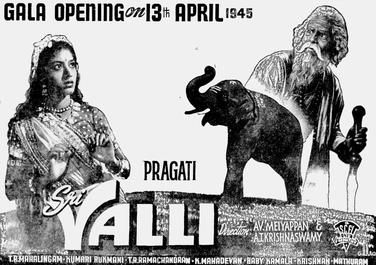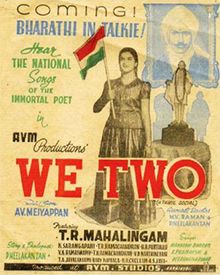This section is for paid subscribers only. Our subscription is only $3700/- for one full year.
You get unlimited access to all paid section and features on the website with this subscription.
Subscribe to read full article
This section is for paid subscribers only. Our subscription is only $37/- for one full year.
You get unlimited access to all paid section and features on the website with this subscription.
Not ready for a full subscription?
You can access this article for $2, and have it saved to your account for one year.
- Release Date13/04/1945
- GenreMythology
- FormatB-W
- LanguageTamil
- Run Time114 mins
- Length3325 meters
- Number of Reels12 reels
- Gauge35 mm
- Censor RatingU
Sri Valli is the story of Valli (Kumari Rukmini), the adopted daughter of tribal chieftain Nambirajan (S. Kuppusamy Iyengar), and her love for Lord Muruga (T.R. Mahalingam). Balavalli (Baby Kamala) grows into a fine dancer and Lord Muruga appears in her dream. She narrates this to her mother, who advises her to pray to him to get him as her life partner. Balavalli grows up as Valli (Kumari Rukmini) and Nambirajan sends her with her brother Killi (T.R. Ramachandran) to prevent birds from eating the crops. Sage Narada (K. Mahadevan) comes to meet her and advises her to accept Lord Muruga as her husband. However, though Valli has an immense liking for him, she refuses, stating she cannot be forced into marriage without her consent. For not respecting his views, Narada curses her and leaves.
The curse is that she will be imprisoned and later married to Lord Muruga. Sage Narada goes to Lord Muruga and advises him of his responsibility to marry Valli and bring her from earth to heaven as God had sent her to earth for a purpose. Narada reminds him that she needs to be imprisoned and then brought as per his curse. Narada also says that though Lord Muruga is known for episodes of his valour, there is no episode of his romance and asks him to create a romantic episode with Valli before marrying her. Disguised as a hunter, Lord Muruga tries to draw Valli’s attention. However, she refuses his advances every time. Once when he is chasing her, Nambirajan turns up and Muruga turns himself into a tree. When Nambirajan orders that the tree be cut, the workers are unable to cut it, which surprises everyone. Lord Muruga comes in another disguise to woo Valli; again she refuses to accept him. One day, Lord Muruga comes to Nambirajan disguised as an old man. Nambirajan protects him and asks him to remain with his children in the field. Lord Muruga commences playing with Valli; she treats him like an old man and happily plays with him. One day, the old man falls into a pond and Valli saves him. To make her accept his suit, Muruga requests his brother Lord Vinayaka for help. Vinayaka, appearing as an elephant, chases and threatens Valli, who runs and seeks the old man’s protection. The old man demands that if she wants his protection, she should agree to marry him. She agrees but soon retracts from her promise after escaping from the elephant, as she is not aware who the old man is.
The elephant again appears, lifts and throws her; she is caught by Lord Muruga in his real shape. Valli is overjoyed to be in the arms of Lord Muruga, whom she was aspiring to marry. Lord Muruga goes back and regularly meets her at her palace. Once Nambirajan notices the arrival and departure of a hunter (Lord Muruga in disguise) from Valli’s chamber, gets angry, and imprisons her. Lord Muruga rescues her from the prison and marries her with the blessings of Sage Narada, whose vow is now achieved. The celestials celebrate the wedding by showering flowers from the sky. When Nambirajan and his people come to attack him, he easily makes them swoon. At the request of Valli, he makes them conscious again. They now apologize for trying to attack Lord Muruga. Valli joins Lord Muruga with his first wife Deivayanai and they give darshan together at their heavenly abode.
The street play tale of Valli’s marriage with Lord Murugan was made earlier as Valli Thirumanam (1933) and Valli (1933).
The film became a musical hit and the songs became very popular. Of the 30 songs, the following songs are remembered even today: ‘Kaayatha Kaanagathey…’, ‘Yaar Undhanai Pol…’, ‘Konjum Kili…’, ‘Mayile Thoodhu…’, ‘Pibare Raama Rasam…’, ‘Thirumal Murugan…’, ‘Amman Magana…’, ‘Singara Vela Marugan’, and ‘Ellorayum Pole...’ and ‘Sindhai Arindhu Vaadi…’
[from the book Pride of Tamil Cinema: 1931 to 2013 by G Dhananjayan, Blue Ocean Publishers, 2014]

Cast
Crew
-
BannerSaraswathi Cine Film Laboratory
-
Director
-
Producer
-
Music Director
-
Lyricist
-
Dialogues
-
Cinematography
-
Editing
-
Art Director/Production Design








.jpg)



